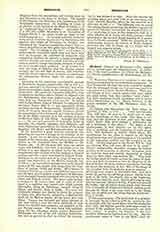

Mediator (CHRIST AS MEDIATOR).—The subject will be treated under the following heads: (I) Definition of the word mediator; (2) Christ the Mediator; (3) Christ’s qualifications; (4) Performance; (5) Results.
(I) MEDIATOR DEFINED.—A mediator is one who brings estranged parties to an amicable agreement. In New-Testament theology the term invariably implies that the estranged beings are God and man, and it is appropriated to Christ, the One Mediator. When special friends of God—angels, saints, holy men—plead our cause before God, they mediate “with Christ”; but their mediation is only secondary and is better called Intercession (q.v.). Moses, however, is the proper mediator of the Old Testament (Gal., iii, 19-20).
(2) CHRIST THE MEDIATOR.—St. Paul writes to Timothy (I Tim., ii, 3-6). “God our Savior, Who will have all men to be saved, and to come to the knowledge of the truth. For there is one God, and one mediator of God and men, the man Christ Jesus: Who gave himself a redemption for all, a testimony in due times.” The object of the mediatorship is here pointed out as the salvation of mankind, and the imparting of truth about God. The mediator is named: Christ Jesus; His qualification for the office is implied in His being described as man, and the performance of it is ascribed to His redeeming sacrifice and His testifying to the truth. All this originates in the Divine Will of “God our Savior, Who will have all men to be saved”. Christ’s mediatorship, therefore, occupies the central position in the economy of salvation: all human souls are both for time and eternity dependent on Christ Jesus for their whole supernatural life. “Who [God the Father] hath delivered us from the power of darkness, and hath translated us into the kingdom of the Son of his love, In whom we have redemption through his blood, the remission of sins; Who is the image of the invisible God, the firstborn of every creature… all things were created by him and in him. And he is before all, and by him all things consist. And he is the head of the body, the church, who is the beginning, the firstborn from the dead; that in all things he may hold the primacy: Because in him, it bath well pleased the Father, that all fulness should dwell; And through him to reconcile all things unto himself, making peace through the blood of his cross, both as to the things that are on earth, and the things that are in heaven”. (Col., i, 13-20).
(3) QUALIFICATIONS.—The perfection of a mediator is measured by his influence with the parties he has to reconcile, and this power flows from his connection with both: the highest possible perfection would be reached if the mediator were substantially one with both parties. A mother, for instance, is the best mediator between her husband and her son. But the matrimonial union of “two in one flesh”, and the union of mother and child are inferior in perfection to the hypostatic union of the Son of God with human nature. Husband, mother, son, are three persons; Jesus Christ, God and man, is only one person, identical with God, identical with man. Moreover, the hypostatic union makes Him the Head of mankind, and, therefore, its natural representative. By His human origin Christ is a member of the human family, a partaker of our flesh and blood (Heb., ii, 11-15); by reason of His Divine Personality, He is “the image and likeness of God” to a degree unapproached by either man or angel. The Incarnation establishing between the First-born and His brethren a real kinship or affinity, Christ becomes the Head of the human family, and the human family acquires a claim to participate in the supernatural privileges of their Head, “Because we are members of his body, of his flesh, and of his bones.” (Eph., v, 30.) Such was the expressed will of God: “But when the fulness of the time was come, God sent his Son, made of a woman. that we might receive the adoption of sons.” (Gal., iv, 4-5; also Rom., viii, 29.) The man Christ Jesus, therefore, who was designed by God to mediate between Him and mankind, and whose mediatorship was not accidental and delegated, but inherent in His very being, was endowed with all the attributes required in a perfect mediator.
Christ’s function as mediator necessarily proceeds from His human nature as principium quo operandi; yet it obtains its mediating efficacy from the Divine nature, i.e. from the dignity of the acting person. Its first object, as commonly stated, is the remission of sin and the granting of grace, whereby the friendship between God and man is restored. This object is attained by the worship of infinite value which is offered to God by and through Christ. Christ, however, is mediator on the side of God as well as on the side of man: He reveals to man Divine truth and Divine commands; He distributes the Divine gifts of grace and rules the world. St. Paul sums up this two-sided mediation in the words: “… consider the apostle and high priest of our confession, Jesus” (Heb., iii, 1); Jesus is the Apostle sent by God to us, the high priest leading us on to God.
(4) PERFORMANCE.—How do we benefit by Christ’s mediation? Christ is more than an enlightening teacher and a bright example of holiness; He destroys sin and restores grace. Our salvation is not due exclusively to the Mediator’s intercession for us in His glorified state in heaven; Christ administers in heaven the fruits of His work on earth (Heb., vii, 25). Scripture compels us to regard the work of the Mediator as an efficient cause of our salvation: His merits and satisfaction, as being those of our representative, have obtained for us salvation from God. The oldest expression of the dogma in the Church formularies is in the Nicene Creed: “crucified also for us”. “Vicarious satisfaction”, a term now in vogue, is not found expressly in the Church formularies, and is not an adequate expression of Christ’s mediation. For His mediation partly replaces, partly completes, partly renders possible and efficacious the saving work of man himself; on the other hand, it is a condition of, and it merits, the saving work of God. It begins with obtaining the goodwill of God towards man, with appeasing the offended God by interceding for man. This intercession, however, differs from a mere asking in this, that Christ’s work has merited what is asked for: salvation is its rightful equivalent. Further: to effect man’s salvation from sin, the Savior had to take upon Himself the sins of mankind and make satisfaction for them to God. But though His atonement gives God more honor than sin gives dishonor, it is but a step towards the most essential part of Christ’s saving work—the friendship of God which it merits for man. Taken together, the expiation of sin and the meriting of Divine friendship are the end of a real sacrifice, i.e. of “an action performed in order to give God the honor due to Him alone, and so to gain the Divine favor” (St. Thomas, III, Q. xlviii, a. 3). Peculiar to Christ’s sacrifice are the infinite holiness of the Sacrificer and the infinite value of the Victim, which give the sacrifice an infinite value as expiation and as merit. Moreover, it consists of suffering voluntarily accepted. The sinner deserves death, having forfeited the end for which he was created; and hence Christ accepted death as the chief feature of His atoning sacrifice.
(5) RESULTS.—Christ’s saving work did not at once blot out every individual sin and transform every sinner into a saint; it only procured the means thereto. Personal sanctification is effected by special acts, partly Divine, partly human; it is secured by loving God and man as the Savior did. Christianus alter Christus: every Christian is another Christ, a son of God, an heir to the eternal Kingdom. Finally, in the fulness of time all things that are in heaven and on earth shall be reestablished, restored, in God through Christ (Eph., i, 9-10). The meaning of this promise is that the whole of creation, bound up together and perfected in Christ as its Head, shall be led back in the most perfect manner to God, from whom sin had partly led it away. Christ is the Crown the Center, and the Fountain of a new and higher order of things: “for all are yours; And you are Christ’s; and Christ is God‘s.” (I Cor., iii, 22-23).
J. WILHELM


